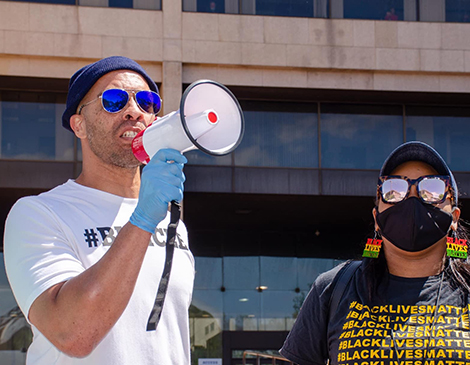I keep coming back to why.
Why did George Floyd have to die? Why did it take this moment in history for many of us to wake up to the racial injustice happening in our country? And why are we still so divided?
I don’t have the answers, but I continue to search for solutions and seek out Black voices who have had to wrestle with why since the day they were born.
Since Floyd’s death on May 25, cities across the world have seen protests — many peaceful, some not — and our city was no exception.
But whatever your beliefs, opinions or thoughts, try to look at the hurt, violence and activism that’s happening right now not as a political issue — but a human issue.
I’ve been raised to treat others the way I would want to be treated, to see the good in others and stand up for what’s right.
And the most important lesson I’ve learned is to stop and listen.
That’s why I’ve been focused on the words of the Black individuals we’ve interviewed for our online series “Why I Protest.”
Maria Cribbs, co-host of CW43’s show Cribbs In the CLE, has been advocating for stronger voter turnout, more education on Black history and changing policies used to excuse police misconduct. She went to the May 30 protest in downtown Cleveland with her two children to show them what activism looks like.
“Going to that protest was something simple to show my kids, you know, don’t be afraid to stick up for yourself. Don’t be afraid to get on the ground and get dirty if you need to,” she told editorial intern Kellie Innes. “It’s just important that you speak up and do whatever you can.”
Black Lives Matter Cleveland organizer and co-founder Kareem Henton has been working to change our community for the better since Tamir Rice’s killing in 2014. Along with his fellow activists, they have been lobbying local and regional politicians for increased police accountability, better funding for local schools and more equitable hiring practices within local police departments.
“It’s about taking action. You can show me better than you can tell me,” he told associate editor Dillon Stewart. “All [local leaders] are showing me is that they value property over people, occupation over residents.”
Henton’s words struck a particular chord with me — we’re all accountable for our actions. We have a phrase that we say often around the Cleveland Magazine office: “Show, don’t tell” when it comes to storytelling.
And we’re showing you at Cleveland Magazine that we’re changing how we listen, act and bring you stories.
I admit that as a news organization in a city that is almost half Black, the editorial staff at Cleveland Magazine (which doesn’t have a full-time Black writer or editor) likes to think that we have been doing our part to amplify the voices of the Black community and inspire change. But we haven’t been doing enough.
Why?
I don’t have an answer for that either. But I’ve been thinking a lot about that too.
What I do know is that we’re committed to doing better through our actions — and by elevating the important Black voices we need to hear right now.




